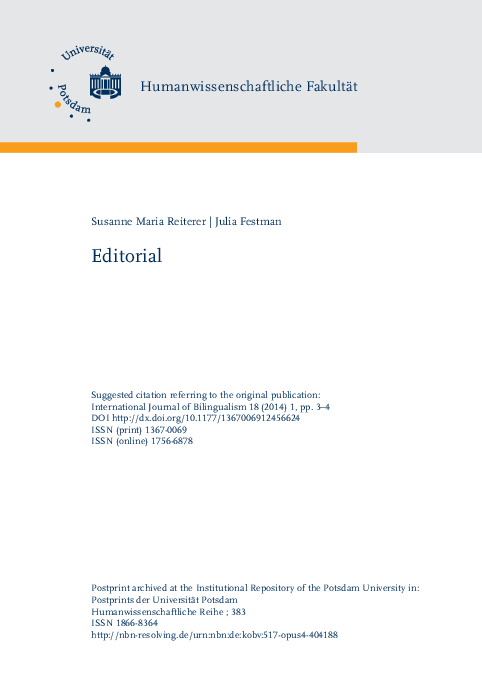Academia.edu no longer supports Internet Explorer.
To browse Academia.edu and the wider internet faster and more securely, please take a few seconds to upgrade your browser.
Special issue: multilingual brains : individual differences in bi-and multilinguals
Special issue: multilingual brains : individual differences in bi-and multilinguals
2014
Related Papers
The most productive and consequential body of research in bilingualism and second language acquisition has been neurolinguistics. This session will (1) introduce participants to the fundamentals of these studies, (2) summarize key findings in understandable terms, and (3) discern pedagogical implications for second language learning.
Language Acquisition and Language Disorders
Chapter 16. Cerebral imaging and individual differences in language learning2010 •
Boeckx C., M.C. Horno & J.L. Mendívil (Eds.) Language, from a Biological Point of View: Current Issues in Biolinguistics. Cambridge: Cambridge Scholars Publishing, pp.184-207. ISBN:1443837814.
More than one language in the brain2012 •
2003 •
Increased understanding of the ways in which multiple languages are represented in bilingual speakers’ brains would undoubtedly advance several theoretical issues in areas such as language acquisition and performance theory. The progress of science forces linguists to draw upon relevant data from neurolinguistics and opens a new avenue for SLA researchers. This literature review will examine neurolinguistic models that have been proposed as an explanation for the coexistence of multiple languages in a single brain and the mechanisms of linguistic segregation. An overview of the study of language localization will be presented, followed by a discussion of neurolinguistic studies investigating the cerebral representation of language in bilinguals. A particular area of focus will be factors affecting language representation in the bilingual brain.
Language, Cognition and Neuroscience
The neuroanatomy of bilingualism: how to turn a hazy view into the full picture2015 •
İSTANBUL INTERNATIONAL MODERN SCIENTIFIC RESEARCH CONGRESS III
SECOND LANGUAGE ACQUISITION: A THEORETICAL REVIEW FROM NEUROSCIENCE2022 •
Language teaching seeks strategies for successful teaching practice, especially when thinking about acquiring a second language. But what is the best way to teach a second language and what are the benefits of learning it? In the past, such questions would be reduced to theoretical models that made use of the subjects' individual experiences. Today, thanks to advances in the field of neuroscience and the expansion of knowledge about the functioning of the brain, these questions can be answered with more solid empirical bases. Thus, this research gathers studies and information related to neuroscience and its contributions to education, specifically in the teaching and learning of a second language. This article aims to instigate researchers to reflect on the approach of neuroscience alongside education to boost language teaching in schools. Neuroeducation is part of cognitive sciences, and can have great relevance in teaching and learning, contributing to the teacher's pedagogical practice. This article was developed based on literature and articles reviews and it is pointed out that: neuroscientific studies indicate brain functioning (in children and adults), propose emotional and technical issues that can cause improvement in teaching; in addition to pointing out the advantages of bi/multilingualism; related to knowing a second language, studies and research register cognitive improvements, as the brain will work differently, activating a new lexicon of words and meanings that contribute to neuroplasticity, these functional analyzes are developed by methods that are used for language neurophysiology research
RELATED PAPERS
Discurso, Cultura e Psicanálise (NASCIMENTO, J; CHAVES, R. orgs)
Entre sujeito, sentido e história: artimanhas entre uma análise do discurso e uma psicanálise2024 •
ÜSKÜP’TE MEDDAH MEDRESESİ
CUMHURİYET REJİMİNDEN MEDDAH MEDRESESİ’NE BALKANLAR’DA TÖRELİ DURUŞUN BİR ÖNCÜSÜ OLARAK FETTÂH EFENDİ2024 •
International Journal of Future Computer and Communication
A Novel PSO Based Algorithm Approach for the cMTS to Improve QoS in Next Generation Networks2013 •
2014 •
La Influencia Andaluza En Los Nucleos Urbanos Americanos Actas De Las Vii Jornadas De Andalucia Y America Vol 1 1990 Isbn 84 404 6218 2 Pags 109 134
Olavide y el Urbanismo1990 •
2013 •
Surface Science
Scattering and adsorption of ballistic phonons by the electron inversion layer in silicon: Theory and experiment1984 •
1996 •
Journal of Food Protection
Practical Evaluation of Mung Bean Seed Pasteurization Method in Japan2010 •

 Julia Festman
Julia Festman